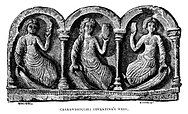Rhiannon
This article needs additional citations for verification. (October 2007) |
| Part of a series on |
| Celtic mythologies |
|---|
 |
In Welsh mythology Rhiannon is the name of a queen, a daughter of Hefeydd. She figures in the first and third branches (parts) of the Mabinogion. In the first part, she is married to Pwyll, in the third part to Manawydan.
Scholars of comparative mythology have compared her to the horse goddess Epona of Gaulish religion. And it is also the name of Welsh Goddess of Horses, like Epona but legend says they are different. Also, it is the name of Fleetwood Mac's #1 song.
Name
The Welsh name Rhiannon appears to be derived from the Proto-Celtic *rīganī "queen" in combination with the augmentive suffix -on.[1] The Romano-British form of this name, if it had existed at that stage, would likely have been *Rīgantonā.[2]
Mabinogion narrative
Pwyll first met Rhiannon when she appeared as a beautiful woman dressed in gold and riding a white horse. Pwyll sent his horsemen after her, but she was too fast. In fact, she was riding no faster than Pwyll and his knights; her horse's swiftness was a mirage she created for Pwyll's and her benefit. After three days, he finally chased her himself. When he spoke, asking her to stop, Rhiannon told him she would rather marry him than the man who was being forced upon her, Gwawl. She made a tryst with Pwyll and after a year from that day, he won her from Gwawl by following Rhiannon's advice to trick Gwawl into climbing into a magic bag that Rhiannon had given to Pwyll, striking an agreement to free him in exchange for Rhiannon.
Rhiannon gave birth to a son after three years of their rule; however, on the night of the birth, the child disappeared while in the care of six of Rhiannon's ladies-in-waiting. They feared that they would be put to death, and to avoid any blame, smeared blood from a puppy on the sleeping Rhiannon, and lay its bones around her bed. Pwyll's counselors imposed a penance on Rhiannon for her crime, to remain in the court of Arberth for seven years, and to sit every day near a horse-block outside the gate telling her story to all that passed. In addition, she was to carry any willing guest to the court on her back.
The child appeared outside a stable of Teyrnon, whose mares had just given birth but the foals had disappeared. Teyrnon had been watching his stables when he saw a mysterious beast coming to take the foal; Teyrnon stopped the beast by cutting off its arm at the elbow, and found the child outside the stable. He and his wife adopted him. The child grew to adulthood in only seven years and was given the foal which had led Teyrnon to the stable. Teyrnon realized who the child was and returned him to Pwyll and Rhiannon, who named him Pryderi (care).
Pryderi married Cigfa and became Prince of Dyfed after his father died. He then invited Manawydan (his stepfather) to live with him in Dyfed. Soon, Dyfed turned into a barren wasteland and only Rhiannon, Pryderi, Cigfa and Manawydan survived. Manawydan and Pryderi, while out hunting, saw a white boar which they followed. Pryderi and his mother, Rhiannon, touched a golden bowl that the boar led them to and became enchanted. Manawydan and Cigfa were unable to help them until they captured a mouse which was actually the wife of Llwyd, Rhiannon's enemy (seeking revenge for her treatment of Gwawl), and the spell was lifted.
Interpretation as a goddess
The Mabinogion does not present Rhiannon as anything other than human. Scholars of mythology have nevertheless speculated that Rhiannon may be a reflex of an earlier goddess of Celtic polytheism. Proinsias Mac Cana states: "[Rhiannon] reincarnates the goddess of sovereignty who, in taking to her a spouse, thereby ordained him legitimate king of the territory which she personified" [3]. According to Professor Green, "Rhiannon conforms to two archetypes of myth ... a gracious, bountiful queen-goddess.: [4].
Some scholars specifically identify her as a horse goddess cognate to Gaulish Epona, because of Rhiannon's close association with horses in the first part of the story.[5]
See also
- 16912 Rhiannon, an asteroid named after Rhiannon
- Welsh mythology
- Welsh mythology in popular culture
- Mabinogion
- Epona
- Étaín
References
- ^ Proto-Celtic—English lexicon.
- ^ e.g. Proinsias Mac Cana (1992) The Mabinogi, Cardiff, University of Wales Press, p. 51; Ross. A. (11992) Pagan Celtic Britain: Studies in Iconography and Tradition, London, Constable, p. 313; Green, M. (1993) Celtic Myths, London, British Museum Press, p. 30.
- ^ Mac Cana, p. 56.
- ^ Green, p. 40.
- ^ e.g. Sioned Davies (trans.), The Mabinogion, Oxford 2007, p. 231.
- W. J. Gruffydd, Rhiannon, Cardiff, 1953.
- James MacKillop, "Rhiannon" in A Dictionary of Celtic Mythology (2004).
